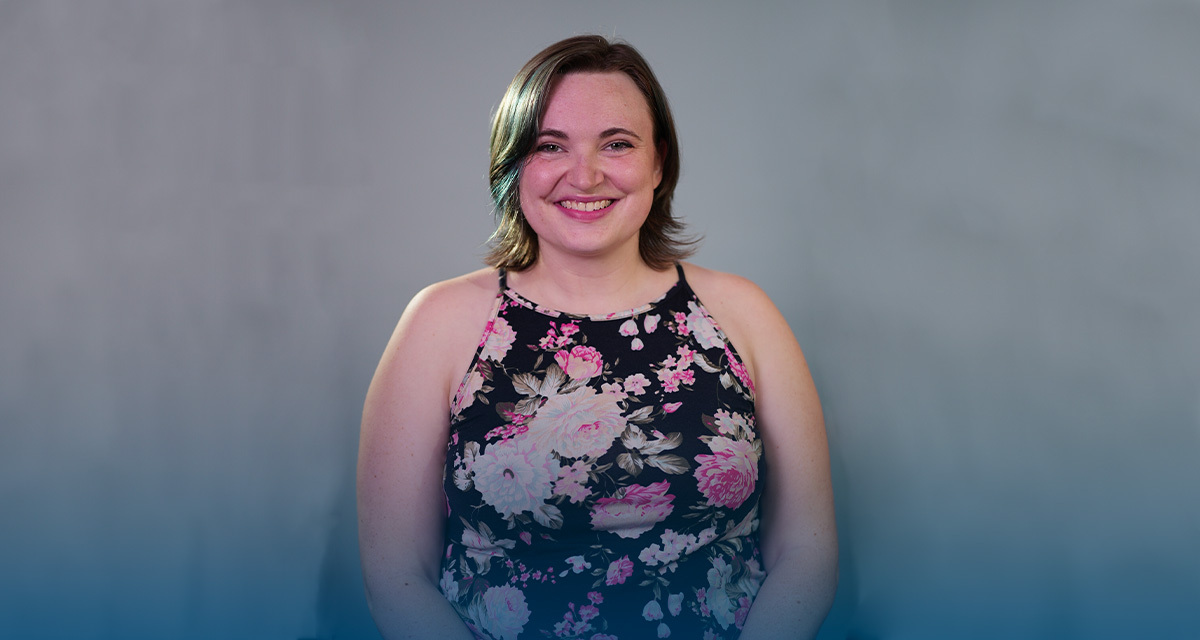Jess Pfohl ’14 on the Challenges and Triumphs of Performing at the Edinburgh Fringe Festival
Jess Pfohl ’14, who studied communication arts (with a concentration in film) and biblical studies at Gordon, helped develop, underscore and host Love is Blind: The Improvised Musical at this year’s Fringe Festival in Edinburgh, Scotland—the world’s premiere indie theatre festival. John Cleese, Steve Coogan and Miranda Hart are just a few of the famous names who got their start at this festival. We sat down with Pfohl, who runs her own full service video production company called Clementine Productions, to learn about her experience.
How did you come up with the idea for Love Is Blind: The Improv Musical Show? What was your role in the production?
My friend Maya had an idea to turn the Netflix reality show Love is Blind into an improv musical. The plan was for Maya to play all the women, our friend Kevin would play all the men and I would play the hosts (Nick and Vanessa Lachey) and all other characters while underscoring the show on the piano.
We condensed an entire season of the Netflix show into an hour-long format: couples meet and fall in love with a wall between them, get engaged without seeing each other, meet to go on a tropical vacation and then spend the next eight weeks together before saying “I do” or walking away forever. Our audiences provide the characters by filling out paper slips of dating bios before the show, and we send the audience’s characters through the ups and downs of love and reality television.
You mentioned that one of your roles was to underscore the show. What does that mean?
Underscoring a show means that I add music by playing the piano. Sometimes I just play background music, but other times I use music to prompt our improvisers to sing improvised songs. If Kevin or Maya says something interesting, or if they’re full of emotion, I’ll play the piano, and they can break out into a musical number. It’s fun to force them to sing something silly by underscoring a throwaway line.
How did you get your show into the 2024 Edinburgh Fringe Festival?
Edinburgh is not as exclusive as people think! The trick is finding a venue and paying for it. I had never been to Edinburgh or performed there before, so I didn’t understand the magnitude of Fringe until I got there. So many spaces in the city were converted into tiny little venues; people everywhere are flyering for their shows. Some Edinburgh festival venues only take famous people or charge a lot. But we got an amazing spot because Maya went on her honeymoon to Fringe in 2023 and scoped out a good venue; we only paid 500 pounds for a weeklong run! The trick was making up that cost through ticket sales.
What was the most challenging part of your experience at the Fringe Festival?
The most challenging part of Fringe is standing out from all of the other shows that are happening simultaneously so enough people buy tickets to your show. It all came down to marketing. The Fringe supported us with free resources, hosted webinars and provided a guidebook of all the shows in Edinburgh. It felt like theatre kid summer camp!
But we could only do in-person marketing, so we had to get creative. We paid for some posters to be hung up and bought flyers to advertise on the street. Using a recognizable show’s name got us some traction; since Love is Blind UK had just come out, we were top-of-mind for a lot of people! We also researched the other musical, dating or improv shows in the Fringe and handed out flyers out at those venues when the audiences came out, since those audiences were more likely to come to our show.
What was the greatest lesson you learned from Fringe 2024?
Fringe taught me that even if a ton of things go wrong, you can still have a great time. We didn’t have a piano until five minutes before our first show; one of our improvisers got Covid-19, and we had to find a sub; and I broke my ankle in the middle of our run. The night after I broke my ankle, I went back to performing just on pain meds and a boot. It could’ve been a bad show, but as a cast we came in with high spirits, played to our audience and had fun. Those last two nights I felt so supported—entire casts from other Fringe performances came to our shows, and so did some Gordon friends! There was a ton of energy in the air, and the shows went great.
What advice would you give to aspiring performers who want to create their own show?
Just do it! I’ve always loved theatre, but I didn’t study it at Gordon, and I never was cast in any of the shows or Sweaty Tooth Madmen. Instead, I took classes and started indie teams and created shows with friends. My advice is definitely to make your own opportunities. Fringe showed me you can really make any show about anything, anywhere. Write a solo show or do something wacky and see what happens!
 The Bell
The Bell